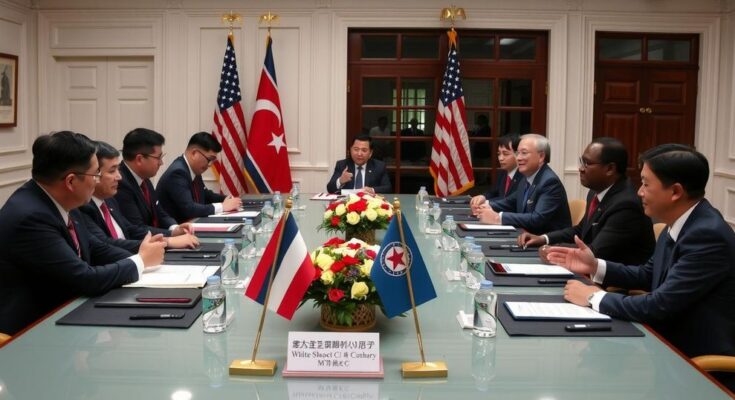President-elect Donald Trump faces uncertainty regarding Korea policy in his second term, with key questions about troop presence and negotiations with Kim Jong-un. His cabinet appointments reflect a mix of internationalist and isolationist perspectives, indicating potential for either a hardline approach or renewed diplomacy. The evolving political context in South Korea and Trump’s favorable view of Kim suggest a complicated path ahead for U.S.-North Korea relations.
Uncertainty clouds President Donald Trump’s policy on Korea as he embarks on his second term. Key questions arise regarding whether the U.S. will withdraw its troops unless South Korea significantly increases its financial contributions to their presence. Will the administration initiate direct negotiations with North Korean leader Kim Jong-un while sidelining Seoul, or will it choose to strengthen security ties as part of a broader strategy to counter China’s influence in the region?
His recent cabinet appointments reveal contrasting inclinations concerning U.S. relations with Korea. Senator Marco Rubio, who has been appointed as the secretary of state, and Representative Mike Waltz, the incoming national security adviser, represent the internationalist faction of the Republican Party and are noted for their strong positions against China and support for a defense buildup. Rubio, in particular, has a history of advocating for stringent sanctions against North Korea and maintaining the United States’ defense commitment to South Korea.
Waltz holds a similar hardline view towards China and is expected to promote a tough stance on North Korea, considering it part of a broader containment strategy against China. Yet, he has shown flexibility in his views to align with Trump, having voiced skepticism regarding U.S. commitments to NATO and Ukraine. Some analysts believe that Waltz would support Trump’s approach for direct engagement with Pyongyang in consideration of his loyalty to Trump and his perspective that Iran, rather than North Korea, poses a more immediate threat.
Moreover, Alex Wong, selected as deputy national security adviser, played a critical role in shaping North Korea policy during Trump’s first term and facilitated his landmark summit with Kim. Trump nominee John Ratcliffe, intended to lead the CIA, has expressed a willingness to re-engage in talks with North Korea, recognizing its nuclear ambitions as, in part, a means of deterrence while suggesting potential for concessions.
Trump’s approach may also evolve based on other proposed nominees showing a penchant for engagement. Pete Hegseth and Tulsi Gabbard—both embodying the isolationist viewpoint—have criticized the establishment’s approach to foreign interventions. While Hegseth’s position on North Korea has fluctuated over the years, he has now embraced Trump’s diplomatic overtures if they succeed in diminishing North Korea’s nuclear capabilities.
Elbridge Colby’s appointment as undersecretary of defense for policy signals a continued focus on China, positing that Korean defense efforts should shift toward countering Beijing’s threats while encouraging South Korea to bolster its military readiness. Gabbard’s vocal criticism of the military-industrial complex emphasizes a need for a reevaluation of U.S. foreign policy priorities.
Despite the political unrest in South Korea under President Yoon Suk Yeol, which may warrant a Trump-led direct engagement with North Korea, the administration’s stance remains uncertain. Kim Jong-un’s recent statements, suggesting a robust anti-U.S. strategy, could be an attempt to coax Trump toward renewed negotiations. Trump’s ongoing positive remarks about Kim reflect an inclination toward diplomacy, underscoring the potential for a transformative approach to U.S.-North Korea relations in the coming term.
The dynamics of U.S. policy toward Korea under President Donald Trump involve considerations surrounding military presence, North Korean relations, and strategic alliances in the context of rising Chinese influence. Since Trump’s initial term, his administration has exhibited fluctuating strategies concerning negotiations with North Korea, driven in part by the evolving political climate in both the U.S. and South Korea. Understanding these geopolitical factors is crucial for analyzing the implications of potential policy changes under the new cabinet appointments.
In conclusion, President Trump’s second term presents a range of possibilities regarding U.S. policy towards Korea, influenced by his cabinet selections and geopolitical considerations. The internationalist versus isolationist divide within his administration highlights differing approaches to North Korea. Regardless of the direction taken, Trump’s proclivity for personal diplomacy with Kim Jong-un remains a defining characteristic, suggesting that engagement could continue even amidst challenges and uncertainties in the broader geopolitical landscape.
Original Source: www.koreatimes.co.kr




